
International Journal for Equity in Health
Scope & Guideline
Advancing Health Equity for All
Introduction
Aims and Scopes
- Health Disparities and Inequalities:
Research examining the differences in health outcomes and access to healthcare services among various demographic groups, including but not limited to socioeconomic status, race, ethnicity, and geographic location. - Social Determinants of Health:
Investigations into how factors such as income, education, environment, and social networks affect health equity and contribute to health disparities. - Policy Analysis and Advocacy:
Studies that assess health policies and their impacts on vulnerable populations, aiming to inform and influence policy changes that promote health equity. - Community-Based Research:
Research methodologies that engage communities in the research process to ensure that the voices and experiences of marginalized populations are included in health research. - Evaluation of Health Interventions:
Assessment of the effectiveness and equity of health interventions, programs, and policies, particularly those targeting underserved or marginalized groups. - Global Health Equity:
Exploration of health equity issues on a global scale, including the impact of globalization, international policies, and cross-border health challenges.
Trending and Emerging
- Intersectionality in Health Research:
An increasing number of studies are adopting intersectional frameworks to explore how overlapping social identities (e.g., race, gender, socioeconomic status) affect health outcomes and access to care. - Mental Health and Equity:
There is a rising focus on mental health as a critical component of health equity, particularly how social determinants impact mental health outcomes in marginalized populations. - COVID-19 and Health Inequities:
Research examining the disproportionate impact of the COVID-19 pandemic on vulnerable populations has surged, highlighting systemic inequities and informing future public health responses. - Digital Health Equity:
Emerging studies are exploring the implications of digital health technologies and telemedicine, particularly regarding access and equity for underserved communities. - Community Resilience and Advocacy:
Research emphasizing community resilience and advocacy efforts to address health inequities is gaining traction, showcasing grassroots initiatives and their impact on health outcomes.
Declining or Waning
- Traditional Public Health Approaches:
Research focusing solely on traditional public health measures without integrating social determinants or equity considerations appears to be waning, as there is a growing recognition of the need for holistic approaches. - Non-Participatory Research Methods:
There has been a noticeable decline in studies that do not incorporate community engagement or participatory methods, reflecting a shift towards more inclusive and collaborative research practices. - General Health Promotion:
While health promotion remains important, there is a reduced focus on generic health promotion strategies that do not specifically address inequities, as the journal emphasizes targeted interventions for vulnerable populations. - Single-Disease Focus:
Research that concentrates exclusively on single diseases without considering the broader context of health disparities and social determinants is becoming less prevalent, indicating a move towards more integrative approaches.
Similar Journals
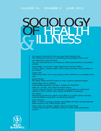
SOCIOLOGY OF HEALTH & ILLNESS
Unraveling the Complex Ties Between Health and CommunitySociology of Health & Illness is a leading academic journal published by Wiley, dedicated to exploring the intricate relationships between health, illness, and society. With an ISSN of 0141-9889 and an e-ISSN of 1467-9566, this journal has established a significant presence since its inception in 1979, continuing to provide valuable insights through to 2024. Recognized in the Q1 quartile across multiple categories, including Health Policy, Health (Social Science), and Public Health, Environmental and Occupational Health, it ranks impressively at 52nd in Social Sciences and holds a robust reputation with a Scopus classification that places it within the top percentiles of its field. The journal’s objectives focus on publishing high-quality research that advances understanding of the social determinants of health and their implications, making it indispensable for scholars, professionals, and students committed to health-related research. Operating from its headquarters in the United Kingdom, **Sociology of Health & Illness** contributes significantly to the global discourse on health and social welfare, reinforcing its vital role in shaping knowledge and policy in health and social sciences.

Health Equity
Fostering collaboration for global health equity.Health Equity is an esteemed open-access journal published by MARY ANN LIEBERT, INC, dedicated to advancing knowledge in the fields of health information management, health policy, and public health. With an E-ISSN of 2473-1242 and a commendable Q1 ranking in multiple categories for 2023, including Health Information Management and Health Policy, this journal stands at the forefront of addressing the complexities of health disparities and promoting equitable healthcare solutions. By providing a platform for original research, critical reviews, and innovative methodologies since its inception in 2017, Health Equity plays a crucial role in facilitating dialogue among scholars, practitioners, and policymakers. The journal's commitment to open access ensures that its valuable content is freely available, fostering collaboration and knowledge dissemination within the global health community. As it converges from 2017 to 2024, Health Equity continues to empower its readership to drive impactful changes in health systems and policies worldwide.
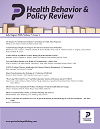
Health Behavior and Policy Review
Transforming Insights into Action for Healthier CommunitiesHealth Behavior and Policy Review is a leading journal in the domain of health policy and public health, published by PATIS Scholar Publishing Ltd. With an ISSN of 2326-4403, this interdisciplinary journal focuses on pertinent issues in health behavior, policy analysis, and the social determinants of health, making it an essential resource for researchers, professionals, and students alike. Although it operates in the open-access realm, it is strategically positioned within the Q3 quartile for Health Policy, Health (social science), and Public Health categories, reflecting its commitment to disseminating impactful research. Covering converged years from 2020 to 2024, the journal aims to bridge the gap between academic research and practical applications in health policy, contributing significantly to the field's advancements. With increasing visibility and relevance, Health Behavior and Policy Review serves as a pivotal platform for understanding and influencing health-related behavior across diverse populations, thereby enhancing public health outcomes.
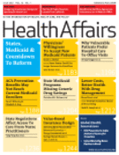
HEALTH AFFAIRS
Shaping the Future of Medicine and PolicyHealth Affairs is a premier journal in the fields of health policy and medicine, published by Project HOPE. With an ISSN of 0278-2715 and an impressive impact factor, this journal has established itself as a vital resource for researchers, policymakers, and healthcare professionals alike. Since its inception in 1981, Health Affairs has been dedicated to providing impactful research and analyses that shape health policy and practice, particularly in the United States. As a leader in the field, it holds a prestigious Q1 ranking in both Health Policy and miscellaneous Medicine categories for 2023, and it stands at an exceptional rank of #5 out of 310 according to Scopus' metrics, placing it in the 98th percentile among peer journals. Although it does not offer open access, its comprehensive studies and expert commentary make it an essential read for anyone committed to understanding and improving health systems worldwide. The journal's address is 7500 Old Georgetown Rd, Ste 600, Bethesda, MD 20814-6133.

HEALTH POLICY
Transforming health policy for a sustainable future.HEALTH POLICY is a leading academic journal dedicated to the examination and analysis of health policy issues globally, published by Elsevier Ireland Ltd. With an impressive Q1 classification in the field of Health Policy, as indicated by its Scopus ranking of #44 out of 310 and an 85th percentile standing, this journal serves as a critical platform for researchers, practitioners, and policymakers interested in the complexities of health systems and the impact of policy decisions. Since its inception in 1984 and continuing through 2024, HEALTH POLICY has consistently contributed to the discourse surrounding health services, equity, and sustainability, providing access to original research, thorough reviews, and insightful commentaries. Although it operates under a traditional subscription model, the journal is essential for those seeking to stay informed on contemporary challenges and emerging trends in health policy.

MILBANK QUARTERLY
Empowering Researchers to Influence Public Health PracticesThe Milbank Quarterly is a preeminent scholarly journal published by Wiley that focuses on a range of vital issues in health policy and public health. With an impressive impact factor underscored by its Q1 rankings in both health policy and public health, the journal serves as an essential resource for researchers and professionals seeking to influence health systems and policies on a global scale. Since its establishment in 1986, The Milbank Quarterly has maintained a commitment to rigorous research and innovative analysis, and it continues to provide a platform for groundbreaking studies that address contemporary challenges in health care. Although it does not currently offer open access, the journal features a comprehensive review process that ensures the publication of high-quality articles aiming to inform policy decisions and elevate public health practices, confirming its status within the top ranks of its field.
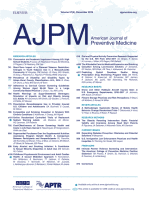
AMERICAN JOURNAL OF PREVENTIVE MEDICINE
Shaping health policy with evidence-based research.AMERICAN JOURNAL OF PREVENTIVE MEDICINE is a premier publication in the fields of Epidemiology and Public Health, published by Elsevier Science Inc. With a commendable impact factor and ranking within the top quartile for both Epidemiology and Public Health categories, this journal serves as a vital source of cutting-edge research, reviews, and critical insights aimed at promoting health and preventing disease. Since its inception in 1985, the journal has been dedicated to disseminating high-quality articles that inform health policy, improve clinical practices, and enhance community health initiatives. It is readily available to researchers and professionals committed to advancing their knowledge and practice, ensuring the continued evolution of preventive medicine. The journal's reach and influence, underscored by its impressive rankings, position it as an essential resource for those looking to make a meaningful impact in the world of preventive health.
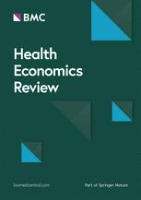
Health Economics Review
Navigating the complexities of health economics for better outcomes.Health Economics Review is a premier, peer-reviewed journal dedicated to advancing knowledge and research in the dynamic field of health economics and policy. Published by BMC, this Open Access journal has been a vital resource since 2011, providing a platform for scholars and practitioners to share their findings and insights on pressing health policy issues. With an impressive Q2 ranking in the Health Policy category and a Scopus rank of 113 out of 310, it reflects a solid standing within the academic community, capturing a 63rd percentile ranking that underscores its contribution to the field. The journal covers an extensive range of topics including health systems, economic evaluations, and policy analysis, making it essential reading for researchers, health professionals, and policymakers. Located in Germany, with an operational address at CAMPUS, 4 Crinan St, London, the journal is committed to fostering innovation and collaboration in health economics, thereby shaping a healthier future for all.

Journal of Racial and Ethnic Health Disparities
Exploring Solutions for Health InequitiesJournal of Racial and Ethnic Health Disparities is a prestigious academic journal published by SPRINGER INTERNATIONAL PUBLISHING AG, dedicated to advancing the understanding of health disparities among racial and ethnic groups. With an exemplary impact across multiple disciplines, the journal is categorized in the Q1 quartile across fields such as Anthropology, Health Policy, and Public Health, indicating its significant contribution to these areas. Since its inception in 2014, the journal has become a key resource for researchers, practitioners, and policymakers, fostering critical discussions and innovative research aimed at addressing the inequalities in health and healthcare access experienced by diverse populations. Although it does not offer open access, the journal ensures high-quality peer-reviewed content that serves as a vital reference within the academic community. Readers can explore in-depth analyses and evidence-based perspectives that not only highlight urgent health issues but also propose solutions that can lead to equitable health outcomes for all.
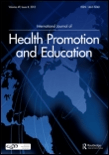
International Journal of Health Promotion and Education
Catalyzing Change in Health Education and PromotionInternational Journal of Health Promotion and Education, a publication of Routledge Journals, Taylor & Francis Ltd, represents a cornerstone in the field of public health and health education, distinguished by its commitment to advancing knowledge and practice since its inception in 1999. With an ISSN of 1463-5240 and an E-ISSN of 2164-9545, this journal facilitates the dissemination of high-quality research dedicated to promoting health and wellbeing at various societal levels. The journal holds a Q3 status in the 2023 category quartiles for Public Health, Environmental and Occupational Health, ranking 389 out of 665 in Scopus, which underscores its relevance within the academic community. The International Journal of Health Promotion and Education publishes a range of articles—from original research to critical reviews—aimed at researchers, healthcare professionals, and policymakers, fostering interdisciplinary dialogue that is crucial for effecting positive health changes. Its rigorous peer-review process ensures only the highest caliber of research is showcased, making it an essential resource for those seeking to impact public health initiatives globally.